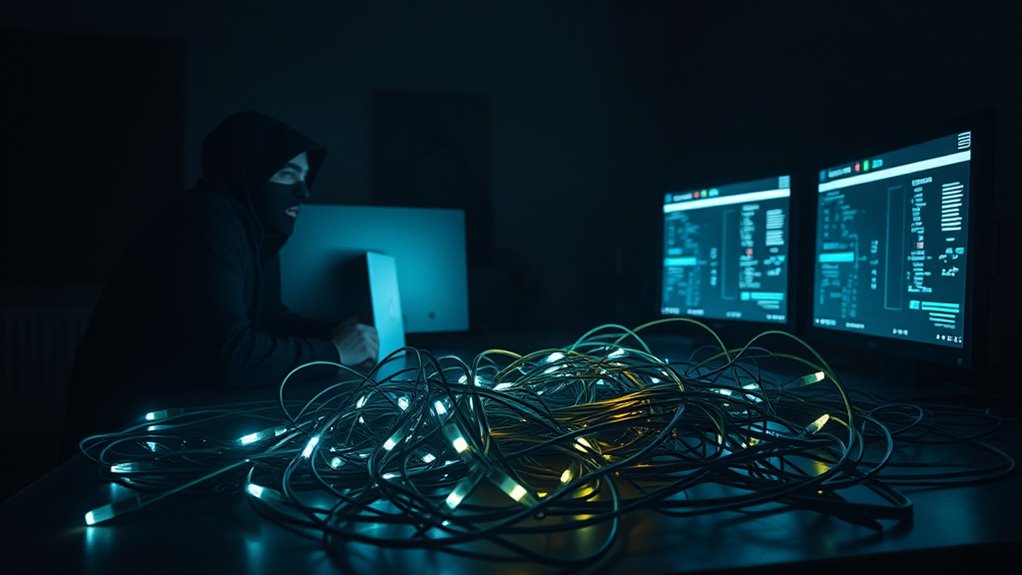UNC3886 is one of the most dangerous Chinese hacking groups targeting your network. With advanced techniques and zero-day exploits, their activities could compromise your security. They manipulate systems, hijack processes, and often focus on critical sectors like technology and defense. The threat they pose is real, and staying vigilant is essential. Being proactive in your cybersecurity measures can help fend off these spies. Discover how to better protect yourself from these emerging threats.
Key Takeaways
- UNC3886 targets network devices and virtualization technologies, posing significant risks to organizations' cybersecurity.
- Employing zero-day exploits and custom malware, UNC3886 disrupts legitimate processes to infiltrate networks.
- To prevent espionage, organizations must continuously monitor networks for unusual activity and intrusions.
- Regular system updates and patches are essential to close vulnerabilities exploited by hacking groups like UNC3886.
- Developing incident response plans and conducting employee training can bolster defenses against potential breaches.

As the digital landscape evolves, you might find yourself unaware that Chinese espionage groups are lurking within your network, ready to exploit vulnerabilities. One of the most notorious among them is UNC3886, a hacking group that specializes in targeting network devices and virtualization technologies. They use sophisticated techniques, including zero-day exploits, to gain unauthorized access to valuable data. If you think your systems are secure, think again; these hackers are adept at infiltrating even the most fortified networks.
UNC3886 isn't alone. Other groups like Volt Typhoon and Salt Typhoon also play significant roles in cyber espionage. These entities often operate under the auspices of the People's Liberation Army, which is deeply involved in military intelligence gathering. Agencies such as the Ministry of State Security and the Ministry of Public Security further enhance the scope of these espionage efforts, making it crucial for you to remain vigilant. Recent trends indicate a significant increase in 40 cases involving espionage reported from 2011 to 2023, underscoring the urgency of addressing these threats.
Other groups like Volt Typhoon and Salt Typhoon, backed by the People's Liberation Army, intensify the urgency of cyber vigilance.
The methods employed by these groups are as varied as they're alarming. They don't just rely on cyber tools; they also engage in human intelligence operations, recruiting military personnel and leveraging online platforms for espionage. You may unknowingly become a target, especially if you work in defense, technology, or telecommunications sectors. Critical infrastructure is also a prime target, with hackers looking to control systems for strategic leverage.
The techniques used by UNC3886 are particularly concerning. They deploy custom malware, hijack legitimate processes, and utilize zero-day exploits to breach your defenses. They manipulate networks by disabling logging and altering system files, making their activities hard to trace. If you're not actively monitoring your network, you could easily miss these intrusions.
The impact of such espionage is staggering. Estimates suggest that intellectual property theft alone costs the global economy over $1 trillion. Moreover, the infiltration of critical infrastructure poses severe national security threats, increasing geopolitical tensions between nations like the U.S., India, and Taiwan. The stakes are high, and the repercussions of failing to act can be catastrophic.
To counter these threats, you must prioritize patch updates and security measures. Regularly updating your systems can close doors that UNC3886 and its associates exploit. As they continue to evolve, so must your defenses. Knowledge is your best weapon; stay informed and proactive to keep these spies at bay.
Frequently Asked Questions
What Is UNC3886 and Why Is It Significant?
UNC3886 is a cyber espionage group linked to China, targeting defense, technology, and telecommunications sectors in the US and Asia.
Its significance lies in its advanced tactics, including custom malware and stealthy operations that compromise critical network devices.
By maintaining long-term access and exploiting vulnerabilities, UNC3886 poses a substantial risk to infrastructure.
If you're in an affected sector, it's crucial to enhance security measures and stay vigilant against these sophisticated threats.
How Can I Detect UNC3886 Activity on My Network?
To detect UNC3886 activity on your network, implement enhanced logging to capture all activities and set up real-time alerts for any suspicious behavior.
Use anomaly detection tools to identify unusual patterns and segment your network to contain potential threats.
Regularly audit your devices for vulnerabilities, and look for indicators of compromise like backdoors or unusual traffic.
Employ the latest security tools and ensure multi-factor authentication is in place for added protection.
What Are the Best Practices for Network Security Against Spies?
Did you know that 43% of cyberattacks target small businesses?
To protect against spies, implement network segmentation to isolate critical systems and use strong access controls, like multi-factor authentication.
Secure your management interfaces by restricting access to trusted networks. Regularly monitor user activity and review logs for unusual patterns.
Use encrypted communication protocols, keep devices updated, and develop incident response plans to ensure you're ready for any threat that arises.
Are There Specific Signs Indicating a Chinese Espionage Attack?
You can spot signs of a Chinese espionage attack by monitoring unusual network activity, like unexpected data transfers or login attempts from unfamiliar locations.
Look for signs of compromised devices, such as slower performance or unexpected software installations.
Additionally, be aware of unauthorized access to critical systems and any anomalies in user behavior.
Regularly review logs for discrepancies, and ensure your security measures are up to date to help detect potential threats early.
What Steps Should I Take if I Suspect a Breach?
Imagine your house has a draft; you'd want to find the source quickly, right?
If you suspect a breach, start by communicating with those affected to gauge the situation. Conduct a mini-assessment to understand what data's been accessed.
Implement containment strategies, fix vulnerabilities, and enhance access controls. Engage forensic experts to analyze evidence and preserve it for future use.
Finally, plan for recovery and ensure compliance with regulations throughout the process.
Conclusion
In a world where cyber threats lurk like shadows, it's crucial to stay vigilant against Chinese spies infiltrating your network. Don't let your data become a playground for these digital phantoms. Act now to fortify your defenses, because every second counts in this high-stakes game. Remember, your network's security isn't just important—it's the difference between a thriving business and a cataclysmic data breach. Stay proactive, stay protected, and keep those spies at bay!









